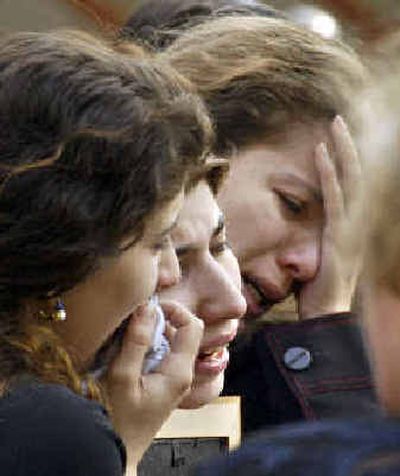Terrorism blamed for Russian crash

MOSCOW – Russian authorities announced Friday that “a terrorist act” had brought down at least one of the two airline jets that crashed this week as investigators raised suspicions that two Chechen women aboard the flights might have been suicide bombers.
Investigators have found “traces of an explosive substance” of a type previously used by Chechen guerrillas in the wreckage of the plane, Sergei Ignatchenko, an FSB spokesman, told the Russian news agency Itar-Tass.
“According to preliminary information, at least one of the air crashes, that in the Rostov region, has been a result of a terrorist act,” he said.
Russian officials had previously said that terrorism was only one of many possible causes being investigated in the downing Tuesday evening of the two jets. A total of 90 people aboard died in the crashes.
An Islamic militant group identifying itself Friday as the Islambouli Brigade claimed responsibility for the attacks in a statement on a Web site linked to Islamic radicals, but there was no way to authenticate the claim.
The crashes came amid fears that separatist rebels in Russia’s southern republic of Chechnya might launch attacks before an election Sunday to replace the war-torn region’s assassinated pro-Kremlin president. A Moscow-backed candidate is expected to win.
The Federal Security Service, or FSB, the main successor to the Soviet-era KGB, also expressed suspicions Friday about the roles possibly played in the twin tragedies by the two Chechen women, Itar-Tass reported.
One of the women, identified as S. Dzhebirkhanova, reportedly checked in for the Sibir Airlines Tu-154 flight headed from Moscow to the Black Sea resort of Sochi that crashed near the southern city of Rostov-on-Don, the news service reported. The second woman, Amanta Nagayeva, was listed on the Volga-Aviaexpress Tu-134 flight from Moscow to Volgograd that crashed about 130 miles south of Moscow at nearly the same time.
Authorities said that in neither case had anyone come forward to claim the two bodies.
Security officials had initially said they did not immediately find any evidence of terrorism in the wreckage, although in both crashes the planes’ tail sections landed hundreds of yards away from the fuselage.
But Gazeta, a Russian-language daily newspaper, reported Friday that investigators were misled because there were no traces of explosives in the passenger areas or cockpits. They then focused on holes in the hulls of both planes where the toilets had been and on the theory that small explosions in those areas sent the planes down, Gazeta said.
The FSB reported discovering traces of an explosive substance, evidence that a bomb did bring down the Tu-154.
Preliminary analysis indicates that the explosive used in the apparent attack was hexogen, said Ignatchenko, the FSB spokesman. That is the same substance used in a series of apartment bombings in 1999 that authorities attributed to Chechen terrorists and cited as a partial justification for launching Russia’s current war against separatists in Chechnya.
In the Chechen capital of Grozny, police officials said they were seeking information about the two women but had not yet reached any conclusions.
“We have started working, and people are working fast. We will establish the addresses. We will find their friends, their acquaintances, and by tomorrow afternoon, I assure you, we will know what kind of people these women were,” Chechen Interior Ministry spokesman Ruslan Atayev said.
Russian President Vladimir Putin, who was prime minister at the time of the 1999 apartment bombings, won popularity with his get-tough response, which helped propel him to victory in his first presidential run the next year. But the FSB has never been able to put to rest the belief of some Russians that it somehow played a role in the bombings.
That is partly because the apartment bombings, by triggering Russian outrage, brought political benefits to Putin, and partly due to a notorious incident in which FSB agents were caught in September 1999 placing what appeared to be explosives in the basement of an apartment building in the city of Ryazan. The agency admitted the men were its agents but said they had put sacks of sugar in the building as part of a training exercise.
Liliya Shevtsova, a political analyst with the Carnegie Moscow Center, noted that the discovery of hexogen calls up memories of the 1999 apartment bombings. “But today such tragedies are absolutely not favorable for Putin,” she said.